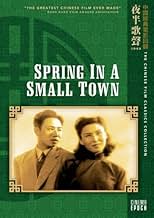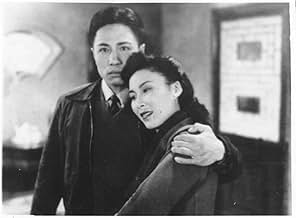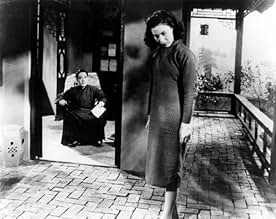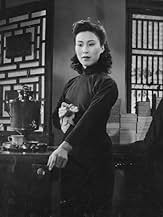IMDb-BEWERTUNG
7,3/10
3585
IHRE BEWERTUNG
Füge eine Handlung in deiner Sprache hinzuA lonely housewife finds her monotonous life altered when her childhood sweetheart returns to town.A lonely housewife finds her monotonous life altered when her childhood sweetheart returns to town.A lonely housewife finds her monotonous life altered when her childhood sweetheart returns to town.
- Auszeichnungen
- 1 wins total
Empfohlene Bewertungen
Produced in 1948 prior to the Communist takeover in China, Spring in a Small Town is a lyrical depiction of the intense psychological rivalry between two friends for the love of one woman. Directed by Fei Mu and based on a short story by Li Tianji, the film dramatizes the emotional entanglement of four people, conveying an intense eroticism that is powerful and haunting. Dai Liyan (Shi Yu), and his wife Zhou Yuwen, magnificently portrayed by the alluring Wei Wei, live in his old family house with Liyan's teenage sister, Dai Xiu (Zhang Hongmei) and the family servant Lao Huang (Cui Chaoming). Because of Liyan's tuberculosis, they are forced to sleep in separate rooms. Yuwen is a loyal and devoted wife but is bored and prefers to spend her time embroidering or going for solitary walks along the top of the crumbling city wall.
When Zhang Zhichen (Li Wei), a boyhood friend of Liyan who is now a doctor arrives from Shanghai, it is revealed that Yuwen was his childhood sweetheart when she was only sixteen. The tension becomes palpable as each character is forced to hide their true self and feelings are expressed only with glances, body language, mannerisms, and silence. Zhichen's arrival brings a spark of life to the moribund household and soon all are taking walks together, singing songs, and playing games. The relationship between Yuwen and Zhichen slowly becomes rekindled and is crystallized at Xiu's 16th birthday party when both have too much to drink. When Yuwen cuts her hand on broken glass after a struggle with Zhichen, however, a distressing event occurs that transforms everyone's life.
Spring in a Small Town has an elegance and intimacy that I found lacking in the remake last year by Tian Zhuanghuang. By depicting events from Yuwen's point of view and adding a poetic voiceover, Mu's film brings us much closer to the characters. Spring in a Small Town did not receive immediate critical acclaim when it was released and Fei Mu was labeled a "rightist" and left for Hong Kong, never to make another film. The film only began to find its audience when the China Film Archive made a new print in the early 80s. Now many Chinese critics consider it the greatest Chinese film ever made. I certainly would not argue with that.
When Zhang Zhichen (Li Wei), a boyhood friend of Liyan who is now a doctor arrives from Shanghai, it is revealed that Yuwen was his childhood sweetheart when she was only sixteen. The tension becomes palpable as each character is forced to hide their true self and feelings are expressed only with glances, body language, mannerisms, and silence. Zhichen's arrival brings a spark of life to the moribund household and soon all are taking walks together, singing songs, and playing games. The relationship between Yuwen and Zhichen slowly becomes rekindled and is crystallized at Xiu's 16th birthday party when both have too much to drink. When Yuwen cuts her hand on broken glass after a struggle with Zhichen, however, a distressing event occurs that transforms everyone's life.
Spring in a Small Town has an elegance and intimacy that I found lacking in the remake last year by Tian Zhuanghuang. By depicting events from Yuwen's point of view and adding a poetic voiceover, Mu's film brings us much closer to the characters. Spring in a Small Town did not receive immediate critical acclaim when it was released and Fei Mu was labeled a "rightist" and left for Hong Kong, never to make another film. The film only began to find its audience when the China Film Archive made a new print in the early 80s. Now many Chinese critics consider it the greatest Chinese film ever made. I certainly would not argue with that.
For Romance's sake, as a married man. The following two films are recommended.
1. Brief Encounter by David Lean (1945), UK
Well, when a woman goes to a railway station, something may happen. And it happened! How she longed to be there, in a little tavern waiting for the man of her dreams. But she was married... the man was a stranger to the fantasizing woman
2. Xiao Cheng Zhi Chun by Fei Mu (1948), China
Well, when a woman goes to the market to buy fish, grocery and medicine, passing through the ruins of an ancient wall in a small town, there is much to think about, about the melancholy of her life, her sick husband in self-pity and lack of future...Just when a jubilant young doctor arrived, something happened... the doctor was a high school honey of the fantasizing woman
In both movies, from great directors of UK and China, the passion vs restraint was so intense, yet in the end the intimate feelings had not developed into any physical contacts. That leaves you with a great after-taste, sniffing it intensely without biting it.
1. Brief Encounter by David Lean (1945), UK
Well, when a woman goes to a railway station, something may happen. And it happened! How she longed to be there, in a little tavern waiting for the man of her dreams. But she was married... the man was a stranger to the fantasizing woman
2. Xiao Cheng Zhi Chun by Fei Mu (1948), China
Well, when a woman goes to the market to buy fish, grocery and medicine, passing through the ruins of an ancient wall in a small town, there is much to think about, about the melancholy of her life, her sick husband in self-pity and lack of future...Just when a jubilant young doctor arrived, something happened... the doctor was a high school honey of the fantasizing woman
In both movies, from great directors of UK and China, the passion vs restraint was so intense, yet in the end the intimate feelings had not developed into any physical contacts. That leaves you with a great after-taste, sniffing it intensely without biting it.
Very interesting to get this glimpse into China in the short interval after WWII and before the communists won the Civil War. We see the fashions of the period pre-communism and a story decidedly not in keeping with social realism or rosy propaganda; instead, these characters have real angst and it's a human tale ala Madame Bovary. The devastation of the country is mirrored in the ruins of the town and in the illness of a man (Yu Shi) living with his increasingly estranged wife (Wei Wei). She's dutiful to him, but the pair are no longer intimate or even in love. Enter her old lover (Li Wei), a doctor who somehow slipped away from her a few years ago, and an illicit love triangle secretly begins simmering.
I loved the first half of the film, where the conflict and desire is told through glances and silences, and it wasn't clear what would happen. Complicating matters (in a good way) is the presence of a cheery 16-year-old sister who is also a possible love interest for the doctor. The film is a little creaky but director Fei Mu gives us some wonderful shots along the old city walls, the breeze fluttering through the grasses as the lovers stir each other's desires. The pace bogs down a little bit as the characters search for resolution to the struggle, with various contemplations of withdrawal, suicide, and even murder. The lovers also go through cycles which represents their torment, e.g. in a moment of passion the doctor whisking the woman off her feet and into his arms, and in the very next, putting her down, walking out the door and locking it. In all of the melodrama it seemed to me the story-telling wasn't as clean as it could have been, and I wasn't as swept up in the emotions of the ending as much as a result. It's interesting to think about the understated emotion and restraint here as it compares to 'In the Mood for Love' (2000) though, and the two films might make an interesting double feature.
I loved the first half of the film, where the conflict and desire is told through glances and silences, and it wasn't clear what would happen. Complicating matters (in a good way) is the presence of a cheery 16-year-old sister who is also a possible love interest for the doctor. The film is a little creaky but director Fei Mu gives us some wonderful shots along the old city walls, the breeze fluttering through the grasses as the lovers stir each other's desires. The pace bogs down a little bit as the characters search for resolution to the struggle, with various contemplations of withdrawal, suicide, and even murder. The lovers also go through cycles which represents their torment, e.g. in a moment of passion the doctor whisking the woman off her feet and into his arms, and in the very next, putting her down, walking out the door and locking it. In all of the melodrama it seemed to me the story-telling wasn't as clean as it could have been, and I wasn't as swept up in the emotions of the ending as much as a result. It's interesting to think about the understated emotion and restraint here as it compares to 'In the Mood for Love' (2000) though, and the two films might make an interesting double feature.
"Spring in a Small Town" is a very simple movie--a simple premise, a small cast and it's all done in a very restrained manner. It's a definite example of minimalistic cinema and is worth your time.
The film is set in rural China--just a year before the Communist takeover. Liyan is sickly--with tuberculosis. However, his main problem is depression--he feels very sorry for himself and has no will to do anything. Most of the time, he just sits outside and broods. Not surprisingly, his wife (Yuwen) is not happy but is quite dutiful towards her husband. Into this sad family comes a surprise visit from one of Liyan's old friends who he hasn't seen in a decade. But it gets more complicated. The friend (Zhang) is shocked to see that Liyan's wife is his old lover!! Not surprisingly, he and Yuwen say nothing and at first, they keep their distance. Where does all this go? It probably doesn't go exactly where you expect....see it and find out for yourself.
My score of 8 is awfully high for such a simple film, but I was impressed that the movie was handled so simply and honestly. My only complaint, and you can't blame the filmmakers, is that the quality of the DVD print is pretty poor. My assumption is that Cinema Epoch did not have access to a better copy--though it would be nice to see this film restored to eliminate the scratches and clean everything up a bit.
The film is set in rural China--just a year before the Communist takeover. Liyan is sickly--with tuberculosis. However, his main problem is depression--he feels very sorry for himself and has no will to do anything. Most of the time, he just sits outside and broods. Not surprisingly, his wife (Yuwen) is not happy but is quite dutiful towards her husband. Into this sad family comes a surprise visit from one of Liyan's old friends who he hasn't seen in a decade. But it gets more complicated. The friend (Zhang) is shocked to see that Liyan's wife is his old lover!! Not surprisingly, he and Yuwen say nothing and at first, they keep their distance. Where does all this go? It probably doesn't go exactly where you expect....see it and find out for yourself.
My score of 8 is awfully high for such a simple film, but I was impressed that the movie was handled so simply and honestly. My only complaint, and you can't blame the filmmakers, is that the quality of the DVD print is pretty poor. My assumption is that Cinema Epoch did not have access to a better copy--though it would be nice to see this film restored to eliminate the scratches and clean everything up a bit.
Xiao Chen Zhi Chun is a great movie, not only in the year it was shot but also now. It's an art movie which is not outdated even in 21st century. The director maintained a good narrative skill and thus made the story so smooth!
The movie reminds me of the later French new wave movie: Francois Truffaut's "Femme d'a cote" which is of the similar topic.
The movie reminds me of the later French new wave movie: Francois Truffaut's "Femme d'a cote" which is of the similar topic.
Wusstest du schon
- WissenswertesVoted the best Chinese-language film of all time by the Hong Kong Film Academy in 2004.
- Alternative VersionenThere is an Italian edition of this film on DVD, distributed by DNA Srl: " PRIMAVERA IN UNA PICCOLA CITTÀ (Spring in a Small Town, 1948) + LA DEA (The Goddess, 1934)" (2 Films on a single DVD). The film has been re-edited with the contribution of film historian Riccardo Cusin. This version is also available for streaming on some platforms.
- VerbindungenFeatured in Venice 70: Future Reloaded: Zhangke Jia (2013)
Top-Auswahl
Melde dich zum Bewerten an und greife auf die Watchlist für personalisierte Empfehlungen zu.
- How long is Spring in a Small Town?Powered by Alexa
Details
- Erscheinungsdatum
- Herkunftsland
- Sprache
- Auch bekannt als
- Spring in a Small Town
- Produktionsfirma
- Weitere beteiligte Unternehmen bei IMDbPro anzeigen
- Laufzeit
- 1 Std. 38 Min.(98 min)
- Farbe
- Sound-Mix
- Seitenverhältnis
- 1.37 : 1
Zu dieser Seite beitragen
Bearbeitung vorschlagen oder fehlenden Inhalt hinzufügen























